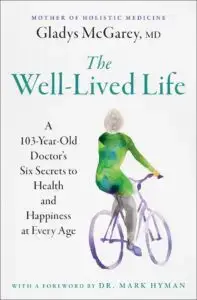
The Well-Lived Life
A 102-Year-Old Doctor’s Six Secrets to Health and Happiness at Every Age
Gladys McGarey
Atria Books (2024)
- Emotional, Intellectual, Physical, Social, Spiritual
- Book, Premium Content, Resource Summary
Key Takeaways
- Purpose sparks progress. Identify one small, meaningful reason to get up each day and let it guide your choices.
- Movement is medicine. Even tiny stretches or gentle walks keep the nervous system flexible and ease FND-related stiffness or fatigue.
- Lead with love, not fear. Self-compassion lowers stress responses that often trigger functional symptoms.
- Cultivate community. Safe, caring relationships calm the vagus nerve and reduce symptom flares.
- Stay curious. Lifelong learning builds brain resilience and offers distraction from symptom hyper-focus.
- Let energy flow. Spend energy on activities that light you up, then rest without guilt to recharge.
Click to read full summary
The Essentials
At 102, holistic-medicine pioneer Dr. Gladys McGarey distills a century of clinical insight and life experience into six “secrets” for joyful longevity: live your purpose, keep moving, choose love, nurture connections, keep learning and let energy circulate freely. She weaves personal stories with gentle, actionable advice—reminding readers that health is more than symptom management; it’s aligning body, mind and spirit with what matters most.
For people with Functional Neurological Disorder, McGarey’s approach resonates: progress comes from respecting the body’s signals, pacing energy and feeding hope every day. Her emphasis on bite-sized movement, self-forgiveness and community support dovetails with evidence that nervous-system regulation improves when we feel purposeful, safe and connected.
Why This Matters for FND
Many with FND battle fatigue, pain and a roller-coaster of neurological symptoms. McGarey’s framework offers low-pressure, high-impact tools—micro-movements, mindset shifts and social rituals—that can be adapted on flare or “good” days alike. Her message counters common stigma by validating that healing is possible at any age and any stage of the journey.
Resource Qualities
Applicability:
Accessibility:
Evidence-Based:
Practical Value:
Practical Applications
For Individuals with FND
Low-Energy Days
- Try the “one-step flow”: wiggle fingers and toes for 30 seconds to signal safety to your nervous system.
Building Long-Term Wellness
- Create a “purpose playlist”—songs that remind you why you keep going—and play it before self-guided PT or daily chores.
For Care Partners
Supporting Your Loved One
- Encourage gentle movement by suggesting a walk to the mailbox or a two-minute stretch video together.
Caring for Yourself
- Sweep away caregiver guilt with McGarey’s “Kutch par wa nay”: release what no longer serves you and make room for fresh growth.
When This is Most Helpful
- Newly diagnosed and seeking hope
- During plateaus when motivation dips
- For care partners learning supportive pacing strategies
- At any age—especially midlife and beyond—when reinventing purpose
This summary is provided for informational purposes only and does not constitute medical, financial, or legal advice. It is not intended to replace professional consultation or treatment. Always consult qualified providers regarding your specific circumstances, symptoms, or questions.
